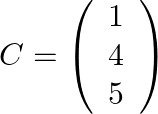Solution:
We have  . and
. and 
Now if number of columns in left matrix is equals to the number of rows in right matrix, multiplication of two matrices is possible.
Next discuss the order of the matrices which are given.
The order of matrix ![]() is
is ![]() , matrix
, matrix ![]() is
is ![]() and matrix
and matrix ![]() is
is ![]()
Thus the multiplications we can proceed as
(i) The multiplication ![]() is possible.
is possible.

(ii) The multiplication ![]() is possible.
is possible.

(iii) The multiplication ![]() is possible.
is possible.

(iv) The multiplication ![]() is possible.
is possible.

From (iii) and (iv) it can be observed that both the matrices ![]() and
and ![]() are of same order
are of same order ![]() and the corresponding elements are same.
and the corresponding elements are same.
Therefore by equality of two matrices we can say here that our matrices are equal.
Hence ![]() .
.

![Rendered by QuickLaTeX.com \mathrm{A}=\left[\begin{array}{lll} 1 & 2 & 5 \\ 0 & 1 & 3 \end{array}\right], \mathrm{B}=\left[\begin{array}{lll} 2 & 3 & 0 \\ 1 & 0 & 4 \\ 1 & -1 & 2 \end{array}\right] \text { and } \mathrm{C}=\left[\begin{array}{l} 1 \\ 4 \\ 5 \end{array}\right]](https://www.learnatnoon.com/s/wp-content/ql-cache/quicklatex.com-28076805d7b71c6daa66bcab8ce41845_l3.png)